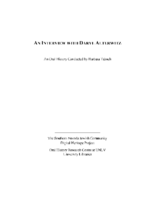Search the Special Collections and Archives Portal
Search Results

Transcript of interview with John Wanderer by Barbara Tabach, May 9, 2016 and May 18, 2016
Date
Archival Collection
Description
In this interview, Wanderer talks about his first career in auto mechanics and car racing, which developed out of a childhood passion, and eventually took him to Charlotte, North Carolina working for Holman and Moody. He then discusses the decision to move back to Las Vegas with wife, Dorothy (Dottie), to pursue his legal career. Wanderer reflects at length about his mother?s trailblazing legal career, and working with her as legal partners. In addition, Wanderer discusses politics, including his observations from the 2016 Democratic State Convention and running for Democratic Party National Committeeman.
Text

Transcript of interview with Suzie Chenin by Barbara Tabach, September 29, 2015
Date
Archival Collection
Description
In this interview, Suzie discusses growing up in Las Vegas, with a strong community of friends, particularly within Temple Beth Sholom. She also talks about her real estate career, both in residential and commercial properties, highlighting some of the successes and challenges. She describes her working relationship with Milton Schwartz, as well her time working with the Greenspuns while selling advertising at the Las Vegas Sun.
Suzie Chenin was born in Cleveland, Ohio, in August of 1949. The next year, her parents, Joseph and Irene Chenin, moved the family to Las Vegas. Her father, a dentist, was stationed at Nellis Air Force Base, becoming the first Jewish dentist in the state ? and only the thirtieth overall. After graduating from Las Vegas High School, Suzie attended Arizona State University. However, she quit school and moved to Los Angeles where she got a job with a large real estate developer. This was her first foray into the industry. A few years later, back in Las Vegas, Suzie got her real estate license, eventually starting her own brokerage firm, Chenin and Associates.
Text

Transcript of interview with Miriam "Mimi" Katz by Barbara Tabach, December 10, 2014
Date
Archival Collection
Description
In this interview, Mimi Katz discusses growing up in the Boston area and her schooling, and moving to Washington, D.C. working as a physiotherapist. She returned to Boston and met her husband, and she talks about moving to Las Vegas and adjusting to life here. They became involved at Temple Beth Sholom, and Mimi worked as a conventions coordinator at the Sands and the Sahara. She discusses moving around in Las Vegas from an apartment to a house in the John S. Park neighborhood, working for the Jewish Federation, and helping to develop the Holocaust education program with Edythe Katz, conducting oral history interviews with survivors. She continued working at the Convention Center in the 1980s, and is involved in the Lou Ruvo Center.
Everyone knows her as Mimi. She was born Miriam Green to immigrant parents in Boston, Massachusetts, in 1926. As a youngster she danced, excelled at school and enjoyed an abundance of sports. To pay for her higher education at Massachusetts School of Physiotherapy she worked at Raytheon Manufacturing. In 1957 she married George Katz who swept her away to their honeymoon in Las Vegas. It's a story that she loves to recall-they never left. She sent for her things and energetically settled in to her new hometown and marriage. Mimi found employment with the Clark County School District, began having children (three daughters), and making fast new friends. Many of these friends were from the founding days of Temple Beth Sholom, which roots her to the history of the local Jewish community. In addition, for a decade she worked in community relations for the Jewish Federation. She valued community activism and volunteered over the years for many organizations; such as Easter Seals, Jewish War Veterans, Parent Teachers Association and the Lou Ruvo Center for Brain Health, and many more organizations over the subsequent decades.
Text

Transcript of interview with Michael Saltman by Barbara Tabach, December 16, 2014
Date
Archival Collection
Description
In this interview, Michael Saltman recounts his family background, his schooling in Michigan, and living abroad in London and Munich. His travels to Israel in 1968 reinforced his connection to Judaism. Saltman and his wife, Sonja, moved to Las Vegas in 1975 and he began working with Larry Larkin, who eventually became his partner. He discusses several projects he completed with Larkin, including shopping centers and apartment complexes. He talks about the changes in Las Vegas that came about from the availability of financing from legitimate sources, and the population growth of the area. He then talks about his involvement in the local Jewish community with the Jewish Federation, Anti-Defamation League and Congregation Ner Tamid.
In 1942, Michael Saltman, the son of a rugged Canadian entrepreneur and of an educator, was born in Flint, Michigan. Michael spent a fulfilling childhood in Flint, where his family was involved in the Jewish community, even helping start a new temple. However, his life changed dramatically when his father passed away during his teenage years. At his mother's insistence, Michael went to law school after graduating from Michigan State University, and received his Juris doctor from Wayne State University. From Detroit, Michael headed to London to participate in an LL.M. program, though he quickly withdrew and landed a position with a life insurance and investment company in London. Michael soon relocated to the company's Geneva office, where his job included establishing operations in Israel. It was during these trips that he more intensely connected with Judaism and his Jewish identity. Michael left the company to join a former colleague at Shareholders Capital Corporation, where he met his wife Sonja. The couple moved to Munich, where they lived until 1975, until moving to Las Vegas. In Las Vegas, Michael became a successful real estate developer. His projects include apartments, shopping centers and office parks, like Village Apartments, Campus Village Shopping Center and Renaissance Center. He later opened Food 4 Less grocery stores in Nevada, Utah and California, eventually buying the Kansas-based company from Lou Falley. He and his partner later sold the company to Kroger. Michael served on the local Jewish Federation's board of directors, and Sonja is a longtime board member for the Anti-Defamation League's regional office in Las Vegas. In 2003, Michael and Sonja co-founded the Saltman Center for Conflict Resolution within William S. Boyd School of Law. Michael's other efforts to promote peaceful conflict resolution include the production of Streetball Hafla, a movie shot in Israel about Jewish and Palestinian teenagers interacting in basketball camp.
Text

Transcript of interview with Daryl Alterwitz by Barbara Tabach, November 8, 2014
Date
Archival Collection
Description
Interview transcript with Daryl Alterwitz by Barbara Tabach on November 8, 2014. In this interview Daryl Alterwitz, son of Deanne and Oscar Alterwitz, recalls moving to Las Vegas from Gary, Indiana, for his parents' pursuits in the furniture business. He speaks about his schooling at Valley High School, his friendship with Robert Engel, and attending University of California Santa Cruz, and taking a leave of absence to travel through Asia. Alterwitz became more involved in Judaism after his bar mitzvah, and has continued his religious affiliation throughout his adult life, and has traveled to Israel twice. He talks about meeting his former wife, his travels through Europe, and coming back to Las Vegas after some time in Reno.
In 1959, Daryl Alterwitz was born in Gary, Indiana, son of Oscar and Deanne Alterwitz. When he was thirteen years old, his family moved to Las Vegas to capitalize on new opportunities in the growing city, and his parents purchased Walker Furniture soon after their arrival. As a high school student, Daryl experienced a powerful trip to Israel, which strengthened his connection to Judaism. After graduation from Valley High School, Daryl attended the University of California - Santa Cruz, and after two years of study, Daryl took time off to travel throughout South Asia, accompanied by close childhood friend Robert Engel. He returned after a year and graduated with an independent major in classical studies. From there, Daryl spent more time in Israel living on a kibbutz. Daryl next went to law school at Santa Clara University, and then supplemented his education with a degree in taxation from New York University School of Law. Between law school and New York, he met his wife, Teri Shoofey; they two had two children, though are now divorced. After New York, he returned to Nevada, first living in Reno. After his father passed away, Daryl moved back to Las Vegas, and took on more responsibility with the family business as well as practicing law. Daryl?s commitment to community service is enduring and visible. He has donated his time and resources to both Jewish organizations, like Jewish Family Services, and non-Jewish groups, like Las Vegas Rescue Mission. He has also served on the boards of the Jewish Federation, Congregation Ner Tamid, and the Anti-Defamation League. Daryl also continues to indulge his passion for international travel, having visited Morocco, Egypt, Turkey, Cambodia, and has even biked from Hungary to Poland.
Text

Transcript of interview with Harry Sax by Barbara Tabach, April 8, 2015
Date
Archival Collection
Description
Interview with Harry Sax by Barbara Tabach on April 8, 2015. In this interview, Sax discusses his family history and upbringing in Chicago, and his military service in Munich. He returned to Chicago and became business partners with Michael Schulson, with whom he opened several Arby's outposts, and expanded to Las Vegas in 1968. He talks about life in Las Vegas in the 1970s and the competition in the fast food industry. He then talks about the reform congregation in Chicago and his connection to Judaism throughout his life. He describes himself as a "closet Jew" before becoming president at Congregation Ner Tamid in 2007. Sax discusses the programs at Ner Tamid for all ages, and his continued involvement in the community.
In 1939, Harry Sax was born in Chicago, Illinois, the son to first generation American Jews. He spent his childhood on Chicago's South, where his family belonged to a progressive Reform congregation. After graduating from Hyde Park High School, he continued his education at Indiana University. In college, Harry was a member of the ZBT Jewish fraternity, participated in a singing group, and was a cadet in the Reserve Officers' Training Corps. Upon graduating from college, Harry was stationed in Munich, Germany as a second lieutenant in the Quartermasters Corps. In addition to his required military duties, he also participated in an after-hours acting group; through this group, he was hired as an extra and for small roles, including The Great Escape. When he finished his service, Harry returned to Chicago, where he connected with a high school friend, Mike Schulson. The two became partners and purchased Arby's franchises in Chicago and Las Vegas. Thus, in 1968, while his partner remained in Chicago, Harry moved to Las Vegas and opened two franchise locations in two weeks. Though it took a few years to stabilize the business and overcome competition, he opened a third location in 1972 on South Decatur, what was then the western edge of the city. Today, Harry has nineteen locations in Las Vegas, with additional franchises in Reno and Barstow, California, and employs nearly 300 people. After about twenty years as a "closet Jew" in the city, Harry reconnected with Judaism and joined Congregation Ner Tamid in the late 1990s. He served on its board, eventually becoming vice president and then president (2007-09). He also dedicated himself to have a bar mitzvah, following up on his Jewish education and confirmation as a teenager. Harry has also served on the Anti-Defamation League's board as well as an active member of the Chamber of Commerce.
Text

Transcript of interview with Henry Kronberg by Barbara Tabach, February 26, 2015 and April 13, 2015
Date
Archival Collection
Description
Interview with Henry Kronberg by Barbara Tabach in two sessions, February 26 and April 13, 2015. In the first session Kronberg talks about his childhood in Germany and Poland and his experience being imprisoned by the Gestapo, and transported to a concentration camp. He survived the Holocaust and met his wife, and they moved to the United States in 1946. He discusses being reunited with his sister in Las Vegas after decades of searching, and moved his family to Las Vegas in 1962. Kronberg talks about becoming involved with Jewish life here, and his wife, Lillian's involvement at Temple Beth Sholom. In the second session, Kronberg discusses purchasing Stoney's, a loan and pawn shop, including some of the clientele and merchandise. He also discusses other social and environmental concerns like anti-Semitism and water resources in Southern Nevada.
Henry Kronberg was born in 1920 and spent his early childhood in a town on the border of Poland and Germany, about 40 miles from Krakow. For years he felt uncomfortable telling his story of surviving the Nazi concentration camps of World War II. Today his name is linked to the Sperling Kronberg Mack Holocaust Resource Center in Las Vegas. And in his soft-spoken manner, Henry recalls his ordeal of loss of family and survival during this most heinous of situations through backbreaking labor and ingenuity. At the end of the war, Henry met the love of his life, Lillian, also a survivor. The two married in 1946 in Frankfurt and immigrated to New Jersey where she had relatives. He describes their difficulties and the various jobs he held until becoming an excellent baker. Then in 1962 an interesting choice took him to a bar mitzvah in Canada. While there the dinner conversation lead him to a great discovery?his sister Lala had survived and was living in Las Vegas. Soon he moved his wife and daughter to Las Vegas. His first foray into business was with his brother-in-law. However, soon it was important to be independent and to control his own destiny. He purchased a going concern, Stoney's Pawn Shop, from Dr. Alexander Coblentz, one of the city's first doctors. He became the fourth owner of Stoney's and operated it until selling it to Steven Mack in 1998. Henry and his wife were active in the Jewish community. They joined Temple Beth Sholom and became fast friends with many of the early leaders of Las Vegas and became a respected member of the secular and Jewish communities.
Text

Transcript of interview with Michael J. Shane by Barbara Tabach, October 26, 2016
Date
Archival Collection
Description
Michael Jay Shane is a natural musician and entertainer. Born in New York City in 1961, Shane is a graduate of the famous High School of Performing Arts, and later attend Peabody Conservatory of Music, before leaving to launch his musical entertainment career full-time. Shane has had a varied and full career ever since as a musical entertainer, working as emcee, comedian, voiceover actor, and musician, showcasing the piano, guitar, saxophone, clarinet as well as vocals. He moved to Las Vegas in 1995, and jobs have included playing the piano at Wynn?s Tower Suite Bar, Bootlegger, and currently, Italian American Club. In this interview, Shane shares about his family and a childhood filled with music. He discusses his career trajectory, and the influence Judaism has had in his upbringing and work. He details differences between working in New York City and Las Vegas, what makes Las Vegas unique for any musician or musical entertainer, and talks about changes in the local entertainment scene since corporations took over the gaming industry. He also shares stories about his career, including working with Jerry Lewis and following Andrew Dice Clay?s standup act.
Text

Transcript of interview with Diana Saunders by Barbara Tabach, April 17, 2017
Date
Archival Collection
Description
Diana Saunders was born Diana Salshutz in the Bronx, the northern most borough of New York City. She was raised in a Jewish neighborhood and recalls how her maternal grandparents pickled pickles, tomatoes and other traditional Jewish delicacies for Wolfie?s Deli. By the time she was twelve years old, Diana was bustling through the city to pursue her dream of becoming a professional dancer. Encouraged by her mother Rose?her father Sidney was not as eager for this pursuit?Diana was accepted into High School of Performing Arts in Manhattan. In addition, she was accepted at the School of American Ballet where she studied classical ballet during the leadership of renowned choreographer George Balanchine. Her first professional performance was in the Nutcracker for American Ballet. At the age of seventeen, Diana was on her own, confident in her dancing potential, and eager to study jazz dancing. This led her to Matt Mattox and to her important mentor, Luigi (Eugene Louis Faccuito). In time she was a featured dancer for Steven Lawrence and Eydie Gorm?s show Golden Rainbow. This was soon followed by a position on Sammy Davis Jr.?s television show in the 1960s. Diana also studied musical acting and showed talent for comedic performance. In the 1970s, Diana crossed paths with Las Vegas venues. She relocated to Las Vegas in 1974 when Donn Arden offered her a dancer position in Hallelujah Hollywood at the MGM. She met and married musical theater actor/singer Joe Bellomo, whose career spanned four decades. He passed away of complications of early onset Alzheimer?s in 1996. Always true to her personal mantra?Wake up; Dress up. Show up?Diana maintains a busy schedule. At the time of this of this interview, she is currently a manger of gondoliers at the Venetian. She brings to life that career and also talks about being a part of the former Star Trek Experience at the Las Vegas Hilton. Diana shares stories of long career as a dancer, from substituting in the black dancer line to continued study of dancing with Anglo Moio. She also talks about the AIDS fundraising event Golden Rainbow, having dinner at Rabbi Shea Harlig?s home and observations of local theater.
Text

Transcript of interview with Sharon Walker by Barbara Tabach, October 8, 2014
Date
Archival Collection
Description
Sharon Walker is a real estate investor, retired stockbroker and former loan officer. She was born on December 8, 1949 in Toledo, Ohio, and moved to Las Vegas with her family in 1963, where they started Walker Furniture, a store which they later sold to the Alterwitz family. Sharon's father, Julius Walker, was also in the casino business, becoming an owner of the El Cortez Hotel and Casino with Jackie Gaughan. Her mother, Anne Walker was a founding member of the first local Hadassah, The Women?s Zionist Organization. Sharon continues the family tradition of being active in Hadassah as well as being a Board Member of Jewish Family Service Agency. In November 2014 she was an honoree of Hadassah Leadership. In this interview, Sharon describes her adolescence in Las Vegas and the differences in culture as compared to her childhood in Toledo, Ohio. She also recalls the Walker Furniture business, her father?s careers, and her uncles Ed ?E? Walker and Lou ?Paddock? Walker.
Text
